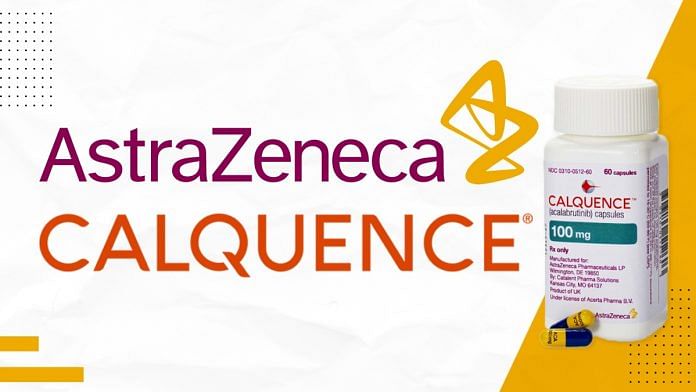New Delhi: British pharmaceutical giant AstraZeneca is set to start a clinical trial on its cancer drug, Acalabrutinib, for treating severe Covid-19 patients with respiratory failure in India as a part of its global trial, ThePrint learnt.
The drug, branded as Calquence, was approved by the US Food and Drug Administration last year for the treatment of certain types of cancers. Acalabrutinib belongs to a class of medications called Bruton’s tyrosine kinase (BTK) inhibitor, which blocks the action of the abnormal protein that signals cancer cells to multiply, stopping the growth of cancer cells.
AstraZeneca last month had announced in peer-reviewed journal Science Immunology that the drug “reduced markers of inflammation and improved clinical outcomes of patients with severe Covid-19”.
According to the company’s website, “the science supporting investigation of the use of Calquence in patients with severe Covid-19 is strong”. Following the “encouraging preliminary data”, the company has initiated global phase 2 trials.
Apart from India, these trials have been launched in Brazil, France, Germany, Italy, Japan, Russia, Spain, Sweden and Turkey, according to the information uploaded by the company on the Government of India portal Clinical Trial Registry of India (CTRI).
While the total sample size of the trial on global scale is 140, according to CTRI, the sample size from India is 60 patients — more than 40 per cent of the total sample size.
ThePrint reached Tapankumar M. Shah, country director, clinical operations at AstraZeneca via email and text messages, but there was no response until the time of publishing this report.
Also read: India initiates human clinical trials in bid to fast-track Covid-19 vaccine development
Status of the trial
Acalabrutinib is being tested for patients with Covid-19 “pneumonia”, which can be documented radiographically. These patients would require hospitalisation or supplemental oxygen. Those enrolled will be administered an oral dosage of the drug for 10 days, twice daily. However, the primary outcome of the drug will be evaluated at day 14 of the trial on the basis of “proportion of subjects alive and free of respiratory failure”.
The Drug Controller General of India (DCGI) approved the phase 2 trial of the drug in India last month, following which, AstraZeneca presented some amendments in the trial design. These were approved by the subject expert committee under DCGI on 9 July, according to minutes of the meeting accessed by ThePrint.
According to CTRI, the Acalabrutinib trial will be conducted at five sites in India — Max Hospital (Saket) and Safdarjung Hospital in Delhi, B.J. Medical College & Civil Hospital in Ahmedabad, Tata Memorial Hospital in Mumbai and Victoria Hospital/Bangalore Medical College and Research Institute in Karnataka.
On a global level, the company has started enrolling patients, but in India, the hospitals’ ethics committees are reviewing the trial proposal, with only Max Healthcare having given its approval so far, according to the CTRI.
ThePrint reached Dr Arun Dewan, principal investigator at Max Healthcare, for details on the trial design and patient enrolment, but there was no response to the email until the time of publishing this report.
Also read: Serum Institute tells Modi govt how pandemic is affecting clinical trials of non-Covid drugs
What makes Acalabrutinib promising?
Acalabrutinib is used to treat cancer in adults who have already had at least one other chemotherapy medication earlier. It is usually given to patients with chronic lymphocytic leukaemia (CLL) and small lymphocytic lymphoma (SLL), which begin in the white blood cells.
According to the peer-reviewed analysis published on the drug, it was given to 19 patients hospitalised with severe Covid-19. Eleven of these patients were on supplemental oxygen while eight were on mechanical ventilation. All but one of the patients had increasing oxygen requirements at the beginning.
“Over a 10- to 14-day treatment course, initiation of acalabrutinib treatment was associated with improved oxygenation in a majority of patients, often within 1 to 3 days, and had no discernible toxicity,” said the analysis.
“Measures of inflammation — C-reactive protein and interleukin-6 (IL-6) — normalised quickly in most patients, as did lymphopenia, in correlation with improved oxygenation,” it said.
At the end of the treatment, the study found that eight of 11 patients (72.7 per cent) had been removed from supplemental oxygen to room air, while four of eight patients on mechanical ventilation had been extubated and put on supplemental oxygen. Two of the latter group recovered even better, and could breathe in room air.
Also read: Plasma therapy — 11 trials underway, many Covid ‘cure’ stories but some doubts linger



